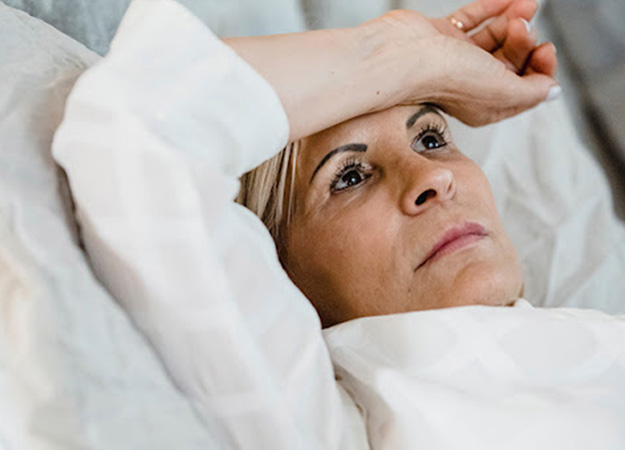Depression and menopause are often mistakenly viewed as similar conditions. However, since each requires a different approach to treatment, recognizing the differences between these two conditions is essential.
Research has also shown that when it comes to psychological problems in women, it’s menopause that should be viewed as the root cause, not depression.
This finding is why hormone therapy (HRT) has been considered the first-line menopause treatment rather than antidepressants.
Hormone Therapy Is a Better Menopause Treatment Than Antidepressants

Are Menopause Symptoms the Same as Depression?
While some menopause symptoms, such as low mood, anxiety, loss of self-esteem, and feelings of sadness or depression, may bear similarities to depression, they are distinct conditions with different underlying causes.
Depression is characterized by faulty mood regulation in the brain, genetic vulnerability, or significant stressful life events. In contrast, menopause-related psychological changes are primarily influenced by hormonal fluctuations.
Estrogen, an essential hormone in the menstrual cycle, regulates a woman’s mood. During menopause, low estrogen levels can disrupt the delicate balance of neurotransmitters in the brain, leading to mood disturbances.
In addition, estrogen modulates the production, release, and reuptake of neurotransmitters like serotonin, dopamine, and norepinephrine, which are involved in mood regulation. The fluctuations in estrogen levels can therefore contribute to mood changes in women.
Can You Take Antidepressants for Menopause?
Yes, antidepressants can be used to manage the psychological issues caused by menopause. So how and in what role can antidepressants help?
Selective serotonin reuptake inhibitors (SSRIs) and serotonin and norepinephrine reuptake inhibitors (SNRIs) are commonly prescribed antidepressants that can help alleviate symptoms such as low mood, anxiety, and irritability associated with menopause.
These medications work by increasing the availability of certain neurotransmitters in the brain, which can improve mood and overall well-being.
Antidepressants can be particularly beneficial for women who cannot tolerate or prefer not to use hormonal treatment options for menopause.
For example, individuals with a history of ovarian or breast cancer choose antidepressants as a safer alternative to hormone therapy. Besides, women with a history of blood clots or untreated high blood pressure may also prioritize antidepressants, as they may carry a higher risk with hormonal treatments.

Why Hormone Therapy and Not Antidepressants
Hormone therapy should be the first-line menopause treatment over antidepressants due to its comprehensive benefits in addressing various symptoms.
While antidepressants help manage the psychological changes associated with menopause, they do not address the entirety of the problems. In other words, menopause symptoms encompass more than just the issues coming from the brain.
They can include vasomotor symptoms (VMS) like hot flashes and night sweats and genitourinary syndrome of menopause (GSM) involving vaginal dryness and discomfort. Also, an increased risk of osteoporosis is often associated with menopause.
What is the primary cause of these various problems? It’s the plummet in estrogen levels during menopause. In this context, hormone therapy aims to alleviate these symptoms by restoring and optimizing estrogen levels in women.
By providing exogenous hormones, hormone therapy can reduce VMS, alleviate GSM, improve bone density, and offer other estrogen-related benefits. Antidepressants, on the other hand, do not directly address the underlying hormonal imbalance.

Alternative Menopause Treatment Options
Apart from hormone therapy and antidepressants, several other treatment options are available for managing menopause symptoms. These alternative approaches focus on alleviating specific symptoms and improving overall well-being.
Here are some options to consider:
-
Lifestyle modifications:
Certain lifestyle changes can help reduce menopause symptoms, including regular exercise, maintaining a healthy weight, avoiding triggers such as caffeine and spicy foods, practicing relaxation techniques (such as deep breathing or yoga), and getting enough sleep.
-
Cognitive-behavioral therapy (CBT):
CBT is a type of talk therapy that can be beneficial for managing mood swings, anxiety, and depression associated with menopause. It helps individuals identify and change negative thought patterns and develop effective coping strategies.
-
Acupuncture:
Acupuncture involves the insertion of thin needles into specific points of the body to promote balance and well-being. Some women find acupuncture helpful in reducing hot flashes, night sweats, and mood swings.
-
Vitamin and mineral supplements:
Adequate intake of vitamins and minerals can be a menopause natural treatment. For example, calcium and vitamin D can support bone health, while vitamin E may relieve hot flashes.
-
Vaginal lubricants and moisturizers:
For vaginal dryness and discomfort during intercourse, over-the-counter vaginal lubricants and moisturizers can provide temporary relief. They help reduce dryness and improve comfort
-
Mind-body practices:
Techniques such as mindfulness meditation, relaxation exercises, and guided imagery may help reduce stress, improve sleep, and manage menopause symptoms.
Is Hormone Therapy the Right Menopause Treatment for You?
Typically, whether you should take hormone therapy must be determined by a healthcare professional who can evaluate your medical history and circumstances. However, some conditions can indicate your suitability for this menopause treatment.
Here are some factors to consider:
-
Presence of menopause symptoms:
If you’re experiencing bothersome symptoms related to menopause, such as hot flashes, night sweats, vaginal dryness, mood changes, or sleep disturbances, you may consider hormone therapy.
-
Surgical menopause:
If you’ve undergone surgical removal of both ovaries (bilateral oophorectomy) or have had your uterus removed (hysterectomy) before natural menopause, you might be a candidate for hormone therapy.
-
Natural menopause:
If you’ve reached natural menopause and are experiencing severe symptoms that impact your quality of life, consider hormone therapy.
-
Overall health evaluation:
Conditions such as a history of breast cancer, ovarian cancer, womb cancer, blood clots, liver disease, or uncontrolled high blood pressure may affect your eligibility or require careful consideration.
-
Individual preferences and goals:
Your preferences and goals play a role in deciding whether hormone therapy is appropriate. Consider factors like the desire to alleviate specific symptoms, improve bone health, or address other concerns.
Bottom Line
Due to the broad spectrum of symptoms experienced during menopause and the primary role of estrogen, hormone therapy should be the preferred menopause treatment option as it offers a more comprehensive approach to managing the issues.
Yunique Medical provides FUNCTIONAL MEDICINE for optimized health and performance. We offer customized, scientifically advanced treatments, including menopause treatments in Ocala, Port Orange, and The Villages, to create a new state of human thriving. Why be ordinary when you can be optimal?
HUMAN 2.0 begins here!
Contact us to schedule your FREE consultation at one of our three locations in Florida – Ocala, Fruitland Park (The Villages), and Daytona.
UP NEXT:

